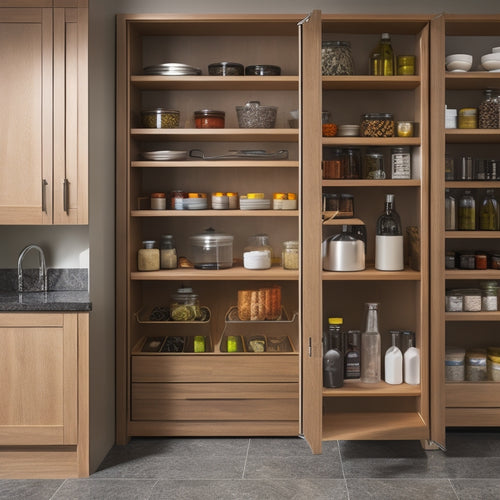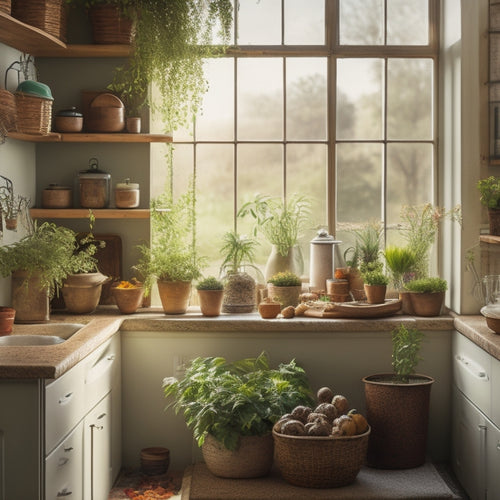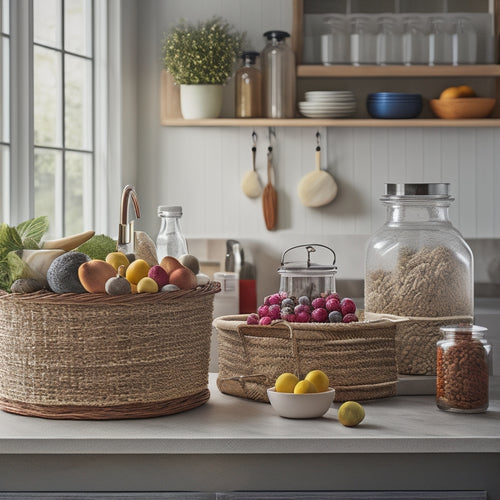
Why Cluttered Countertops Are Holding You Back
Share
You're likely unaware of the profound impact that cluttered countertops are having on your daily life. They're increasing your stress levels, draining your mental and physical energy, and wasting your time and money. Expired or spoiled food, duplicate purchases, and wasted storage space are just a few ways clutter is draining your wallet. Additionally, clutter is affecting your mental and physical health, making you feel anxious, frustrated, and unmotivated. It's also holding you back from being a gracious host, causing social anxiety and awkward silences. Discover the full extent of how cluttered countertops are holding you back and reveal a more fulfilling life.
Key Takeaways
• Cluttered countertops increase stress levels, derail morning routines, and set a chaotic tone for the day, affecting overall well-being.
• Cluttered kitchens lead to financial burdens through expired or spoiled food, duplicate purchases, and wasted storage space, draining your wallet.
• Clutter negatively impacts mental and physical health, causing anxiety, relaxation issues, and poor sleep quality, and draining mental and physical energy.
• Cluttered countertops waste time and energy, causing frustration and productivity drains, and pulling focus away from present tasks and efficient meal preparation.
• Cluttered kitchens hinder social gatherings and connections, causing social anxiety, emotional unease, and awkward silences, holding you back from being a gracious host.
Cluttered Countertops Cause Stress
As you navigate your kitchen, cluttered countertops assault your senses, instantly ramping up your stress levels. The visual overload can be overwhelming, making it difficult to focus on the task at hand.
A cluttered kitchen can derail your morning routine, setting a chaotic tone for the rest of the day. Imagine waking up to a peaceful, organized space that sparks energy and motivation. Instead, you're hit with a mess that makes you want to hit the snooze button.
Cluttered countertops can also affect your mental well-being, causing feelings of anxiety and frustration. When every available surface is cluttered, it's hard to find what you need, leading to wasted time and increased stress.
Hidden Costs of Kitchen Clutter
Hidden Costs of Kitchen Clutter
Kitchen clutter quietly drains your wallet, with expired or spoiled food, duplicate purchases, and wasted storage space adding up to a significant financial burden. You may not realize it, but cluttered countertops are costing you money.
When you can't find what you need, you're more likely to buy duplicates, which can add up quickly. Additionally, cluttered storage spaces lead to wasted resources, as you're not utilizing your kitchen's full potential.
This financial burden doesn't just stop at the initial cost. It also includes opportunity costs – the value of what you could've accomplished with that money. Think about it: the money you spend on unnecessary purchases could've been invested in a cooking class, a new kitchen gadget, or even a fun night out with friends.
Impact on Mental and Physical Health
You're not just losing money to cluttered countertops, but also precious mental and physical energy, as the stress and frustration of managing a disorganized kitchen can seep into other areas of your life. A cluttered kitchen can lead to increased anxiety levels, making it difficult to relax and unwind after a long day.
This, in turn, can negatively impact your sleep quality, leaving you tired and groggy in the morning. Additionally, the emotional toll of kitchen clutter can affect your digestive issues, making it harder to maintain a healthy diet and lifestyle.
When you're constantly surrounded by chaos, it's easy to feel overwhelmed and stuck, leading to a lack of motivation and energy. By decluttering your kitchen, you can free up mental and physical space, allowing you to focus on what matters most – your well-being and the well-being of those you care about.
Take control of your kitchen, and take control of your health.
Time-Wasting Consequences of Clutter
Every hour spent searching for misplaced utensils, ingredients, or recipes is an hour stolen from cooking, sharing meals with loved ones, or simply enjoying your newly decluttered space. You're not just losing time; you're also wasting precious energy. The constant stress of searching for what you need can be overwhelming, causing frustration and anxiety.
Cluttered countertops lead to a productivity drain, making it difficult to focus on the task at hand. You're constantly sidetracked, searching for that one ingredient or utensil, which pulls you away from the present moment. The lost moments add up quickly, turning what should be a joyful experience into a chaotic one.
Imagine the freedom of having everything you need within easy reach. No more scrambling, no more stress. You'd be able to cook with confidence, whip up meals with ease, and share laughter with loved ones.
How Clutter Affects Social Life
When your countertops are cluttered, you're likely to feel anxious about having guests over, and they'll probably feel uncomfortable too.
You might find yourself constantly apologizing for the mess or making excuses to avoid social gatherings altogether.
As a result, your social life starts to suffer, and you miss out on valuable connections with friends and family.
Social Anxiety Rises
Cluttered living spaces can make you feel self-conscious about hosting social gatherings, leading to increased anxiety about inviting friends and family over. You might avoid hosting events or gatherings because you're afraid of being judged or criticized for the state of your home. This fear avoidance can lead to feelings of isolation and disconnection from social norms.
You may start to decline invitations or make excuses to avoid hosting, which can further exacerbate feelings of loneliness and anxiety. As a result, you may start to withdraw from social interactions, feeling like your cluttered space is a reflection of your worth as a host or friend. This can lead to a vicious cycle of social anxiety, where you're hesitant to invite others into your space, and in turn, feel more isolated and disconnected from those around you.
Guests Feel Uncomfortable
You're acutely aware that your guests feel uneasy as they navigate through the narrow pathways between piles of stuff, their eyes darting towards the overflowing countertops, and their body language screaming discomfort. The cluttered space makes them feel like they're intruding, and they can't wait to leave.
It's not just about the physical discomfort; it's about the emotional unease that comes with being in a cluttered environment. Impromptu gatherings, which are meant to be joyful and spontaneous, become awkward and strained. The clutter creates awkward silences, as your guests struggle to find something to talk about besides the mess.
You want to be a gracious host, but the clutter is holding you back. You can't relax and enjoy the company of your guests when you're worried about them tripping over a pile of dirty dishes or knocking over a stack of precariously balanced items.
Path to a Clutter-Free Kitchen
Taking control of your kitchen's countertops is the first step towards a more organized, efficient, and enjoyable cooking experience. You're not just cooking for yourself; you're serving others, and a cluttered kitchen can make you feel overwhelmed and anxious. To create a peaceful and productive space, focus on the essential kitchen essentials that make meal prep a breeze.
Identify the must-haves, such as a quality chef's knife, pots, pans, and utensils, and allocate a designated spot for each item. This will help you maintain a sense of order and make cooking more enjoyable.
When designing your kitchen layout, keep in mind key design principles like the 'work triangle' concept, where your sink, stove, and refrigerator form the points of a triangle. This layout promotes efficiency and minimizes walking distances. Additionally, consider a 'zone' approach, where you dedicate specific areas for tasks like food prep, cooking, and cleaning.
Frequently Asked Questions
Can a Cluttered Countertop Affect My Home's Resale Value?
When you're selling your home, a cluttered countertop can negatively impact its appraisal value and influence buyer perception, making your space appear smaller and less desirable, ultimately affecting its resale value.
How Do I Declutter Countertops With Limited Storage Space?
You'll master decluttering countertops with limited storage space by thinking Space Savvy and embracing Vertical Maximization. Install shelves, hooks, and magnetic boards to optimize your walls, keeping countertops clear and functional.
Are There Any Benefits to Having Some Clutter on My Countertops?
"Like a painter's canvas, your countertops are a space for self-expression. Embracing some clutter can spark creative freedom, allowing you to showcase personal treasures and curiosities that tell your story, but be mindful not to let it overwhelm."
Can Cluttered Countertops Attract Pests or Create Sanitation Issues?
You're creating hidden habitats for pests when you let clutter build up on your countertops, increasing the risk of foodborne illness by attracting rodents, cockroaches, and other pests that contaminate food and surfaces.
Are There Any Eco-Friendly Ways to Organize and Declutter My Countertops?
"Like a phoenix rising from the ashes, you can revive your countertops with eco-friendly solutions. Opt for sustainable materials, repurposed decor, and clever storage ideas to create a clutter-free haven that sparks joy and serves others."
Related Posts
-

Space-Saving Lazy Susan Cabinet Solutions
Space-saving Lazy Susan cabinet solutions can change those awkward corner spaces into organized storage wonders. You'...
-

Tiered Kitchen Rack Ideas for Small Spaces
Tiered kitchen racks are perfect for maximizing small spaces while adding style and functionality. Install wall-mount...
-

Countertop Storage Ideas for Busy Homeowners
As a busy homeowner, optimizing your kitchen countertop is essential for efficiency and style. Consider using vertica...


